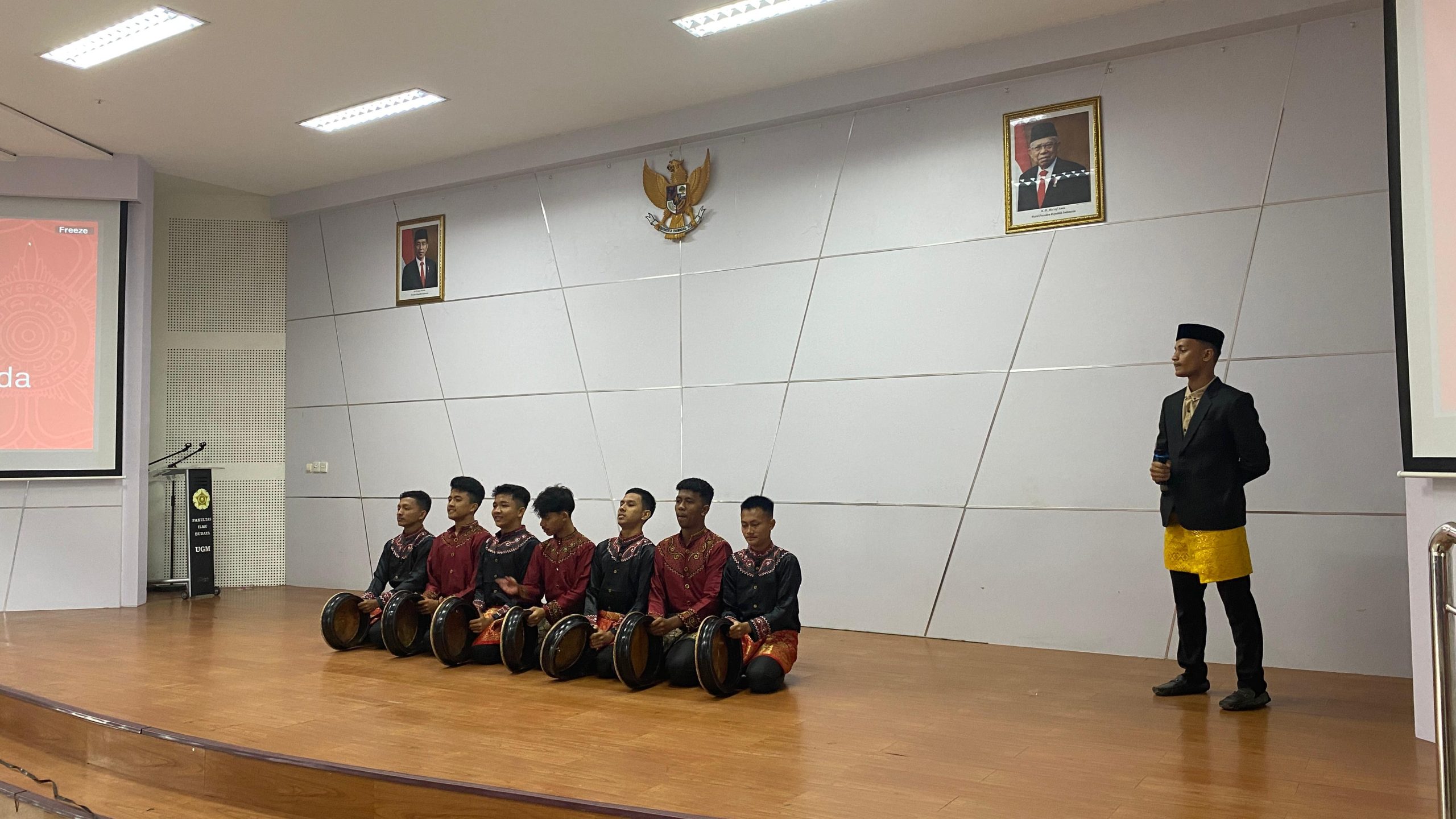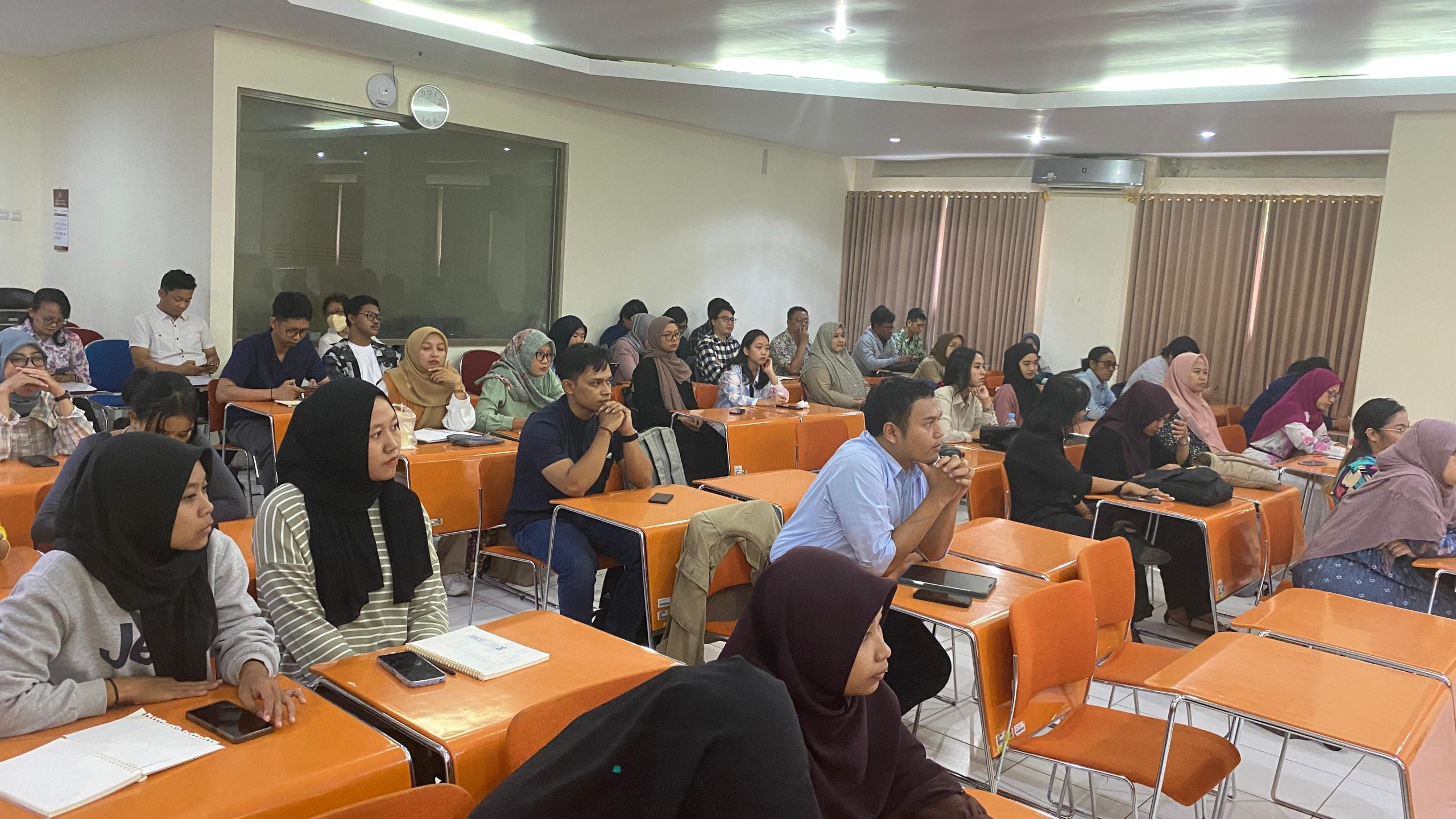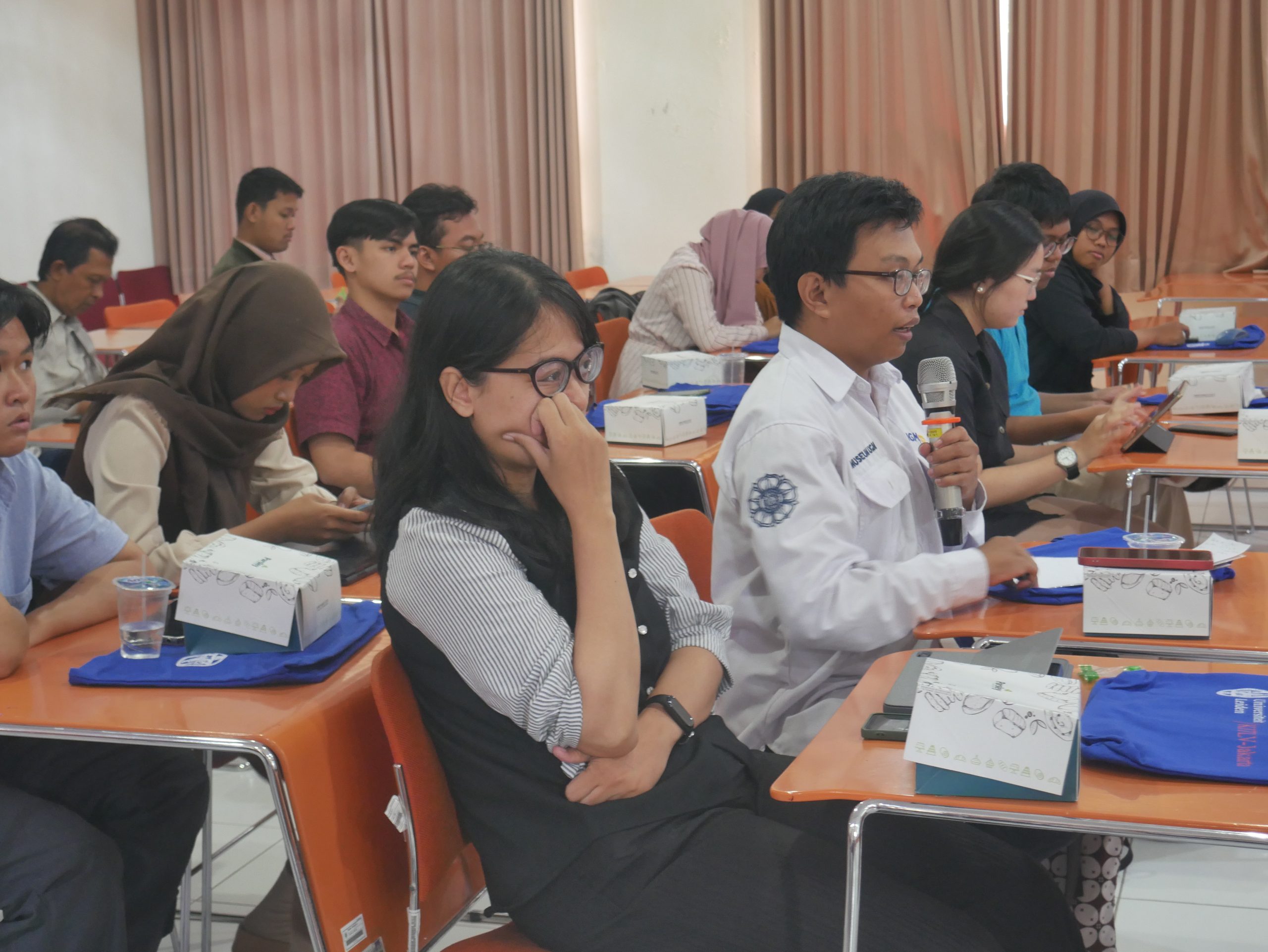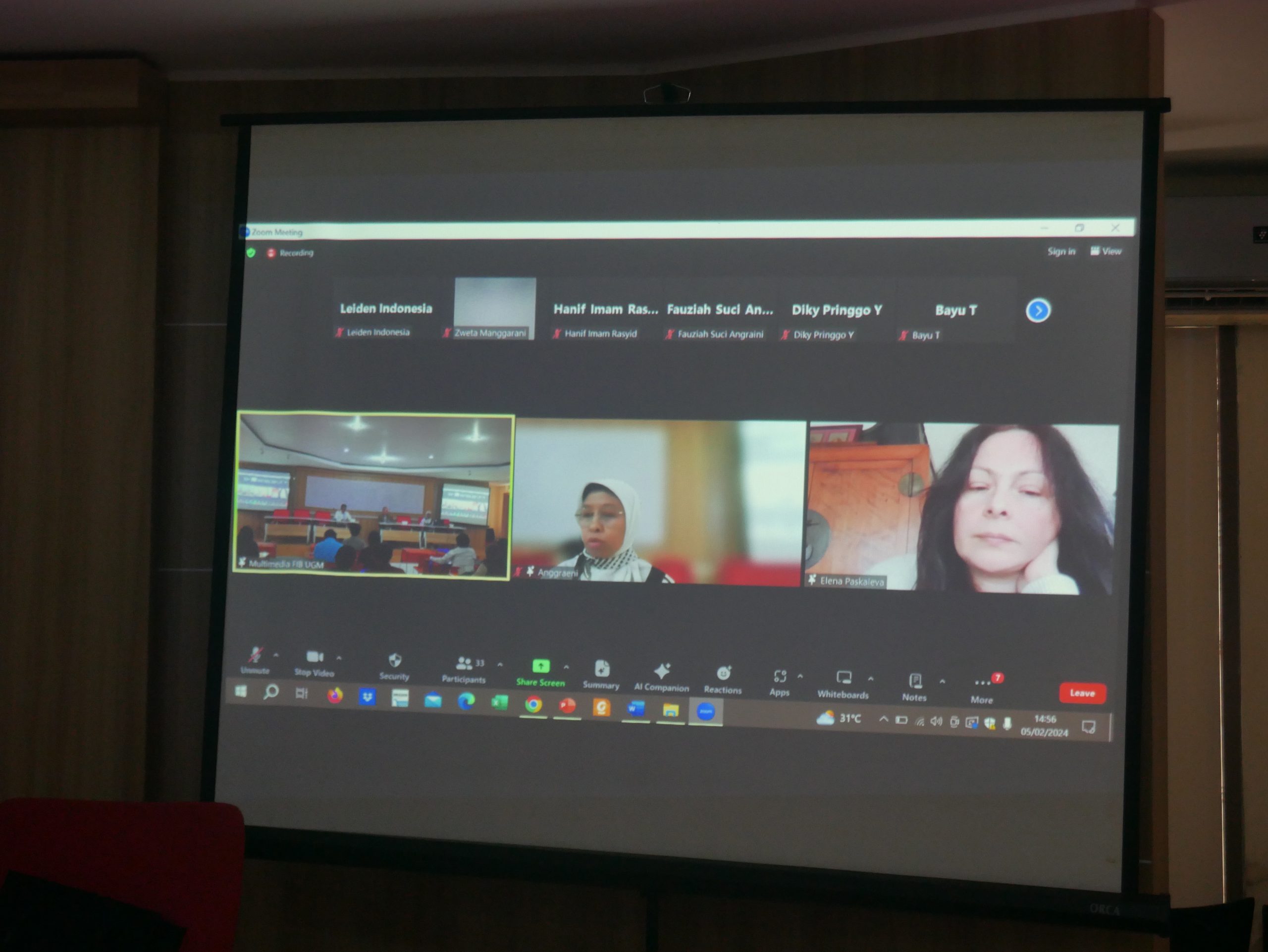SDGs 4: Quality Education | SDGs 4: Education | SDGs 11: Adaptable | SDGs 16: Accountability | SDGs 16: Education
News Release Tuesday, 14 May 2024
SDGs 4: Quality Education | SDGs 4: Education | SDGs 11: Adaptable | SDGs 16: Accountability | SDGs 16: Education
A student from the Master’s Program in Middle Eastern Cultural Studies at UGM, Rafika Fidlaty Zulfa, achieved the highest GPA in the Faculty of Cultural Sciences. This marks a new accomplishment for the Master’s Program in Middle Eastern Cultural Studies, which received direct appreciation from the Vice Dean of the Faculty of Cultural Sciences at Gadjah Mada University, Dr. Nur Saktiningrum, M.Hum. As an outstanding student, Rafika was given the opportunity to deliver a speech at the graduation ceremony in the Faculty of Cultural Sciences held on Wednesday, April 24, 2024.
In her speech, representing the graduates, she expressed gratitude to the lecturers and staff who have played a significant role in educating the students. She emphasized that becoming an alumnus is not a finish line but a starting gate for facing life in the real world. UGM alumni must uphold the values of Pancasila. Equipped with the knowledge from their studies, UGM alumni are sure to compete globally, both nationally and internationally.
News Release Monday, 6 May 2024
SDG 4: Quality education | SDGs 4: Cultural diversity | SDGs 4: Enrolment | SDGs 4: Equal access | SDG 10: Reduced inequality | SDGs 10: Culture | SDGs 10: Education | SDG 11: Sustainable cities and communities | SDGs 11: Adaptable | SDG 16: Peace, justice and strong institutions | SDGs 16: Accountable institutions | SDGs 16: Education
The month of Ramadan has passed. Visits from outside the region to the Faculty of Humanities, Universitas Gadjah Mada are busy again. This time, on April 29, 2024 at 9 am, the faculty was visited by younger siblings who came all the way from Aceh, namely the modern boarding school MA Teuku Chiek Oemar Diyan. Wearing polite and closed clothes typical of the city of Mecca portico in green and combined with black suits and caps for men, 104 students and 6 accompanying teachers entered the auditorium in an orderly and enthusiastic manner while taking pictures and recording videos. The MC opened and warmly welcomed their arrival, followed by remarks from school representatives. “From the tip of Aceh, the first time to Java, many cultural differences are found so that we have to adapt a lot. Therefore, please apologize if there are mistakes made by our students,” said one of the accompanying teachers who gave a speech.
Next, they watched video screenings and quizzes. This session not only practiced concentration, but also increased knowledge about Universitas Gadjah Mada and the Faculty of Cultural Sciences in particular. To add more insight to the students, an additional session was provided, namely a sharing session of Prof. Irwan’s journey from Aceh to become a professor at UGM. He gave motivation that villagers can go international if they go to UGM. FIB also does not see where we are from because everyone is diverse, “Acehnese nutrition is still good because they eat fish, which is lacking in business, so let’s try and Insha Allah we will meet again here,” he said. Mas Yusuf, who is the staff of the academic and student affairs department, also conveyed some more specific things about academics, and introduced the web which has complete information. The students’ enthusiasm was even more apparent during the questioning session. The event was closed with a very entertaining performance from the students.

HEADLINESNews Release Tuesday, 16 April 2024
SDG 4: Quality education | SDGs 4: Education in developing | SDGs 4: Education | SDGs 4: Access to education | SDG 8: Decent work and economic growth | SDGs 8: Creativity and innovation | SDG 9: Industry, innovation and infrastructure | SDGs 9: Affordable access | SDG 16: Peace, justice and strong institutions | SDGs 16: Accountable institutions | SDGs 16: Education | SDG 17: Partnerships for the goals | SDGs 17: Capacity building | SDGs 17: Fostering innovation
Just as additional information about the position of the Anthropology department of FIB UGM, in the middle of a collection of anthropology departments in the world, is now at level 51-100 (top 100). The question is: approximately whether the UGM Anthropology department is at the same level as anthropology departments at other universities? The answer is very surprising. UGM Department of Anthropology is on the same level as Anthropology departments at the following universities: Monash University (Australia), John Hopkins University, Northwestern University (USA), Radboud University in Nijmegen (Netherlands), City University of New York (CUNY) where Eric Wolf is a famous anthropology figure; a famous Anthropology figure, University of California San Diego, University of North Carolina (where James Peacock, who researched Muhammadiyah in Yogya), Oslo University, Bergen University (where Fredrik Barth a famous Norwegian anthropologist), University of Illinois (where Edward Bruner, who researched Batak people, and many more anthropology departments in other famous universities. Congratulations to our Anthropology friends!
Dean of Faculty of Arts UGM, Prof. Dr. Setiadi, said the achievement of Anthropology UGM was certainly very proud considering it is very rare for study programs in Indonesia to enter the top 100 in the world. “For Faculty of Cultural Sciences, this achievement becomes a trigger as well as learning so that other study programs can enter the same category,” Setiadi told reporters on Saturday (13/4). He acknowledged the success of Anthropology Study Program, Faculty of Cultural Sciences UGM in being ranked 51 QS World University Rankings (WUR) by Subject for 2024 is inseparable from the excellence of academic assessment, publications, number of citations, impact to the quality of graduates produced. According to him, the support provided by FIB UGM in the availability of research funds, opening up opportunities for cooperation, and facilitating the development of human resources for further studies greatly supports this study program to be more advanced and international. “Moreover, we at FIB already have a policy to determine lecturers who must graduate from doctoral degree and recruitment of new lecturers must also have doctoral degrees,” he said.
HEADLINESNews Release Wednesday, 21 February 2024
SDG 4: Quality education | SDGs 4: Education | SDG 8: Decent work and economic growth | SDGs 8: Culture | SDG 11: Sustainable cities and communities | SDGs 11: Adaptable | SDG 16: Peace, justice, and strong institutions | SDGs 16: Education | SDG 17: Partnerships for the goals | SDGs 17: Fostering Innovation
The title of this Public Lecture succeeded in attracting the attention of students from the Faculty of Cultural Sciences, Gadjah Mada University who were interested in concentrating on translation to attend the Multimedia Room on the 2nd floor of the Margono Building on Tuesday 20th of February 2024. Students from various levels and classes as well as lecturers filled the room from 9 am to gain new knowledge about translation from extraordinary sources in their field. The resource person is the Head of Pacific and Asian Students from the University of Victoria (British Columbia, Canada). Before presenting his material, he expressed his deepest gratitude to the Faculty of Cultural Sciences for supporting his research and to the students who were willing to take the time to attend the general lecture.

The material opened by explaining the meaning of translation so that public lecture participants knew the basic knowledge first before discussing translation and its problems in more depth. The use of differentiation in each concept of religion and atma was one of the problems in translation where there might be a language transformation adapted from the old concept to the new constitution. On the issue of religion and atma, there were a number of terms and other languages that were trapped in language transformation efforts. The presenter delivered the material in a way that was easy to understand, namely by relating it to examples found in everyday life based on the presenter’s personal experience. From the presentation given, he concluded that the use of linguistics, especially in the field of translation, could not be separated from concepts in everyday life.
Prof. Dr. Faruk HT., moderator at this public lecture, closed by providing a simpler conclusion that there were three important points that could be noted. First, translation as a crossing of meaning. This does not only apply to interlanguage translations but also between languages, for example between one group and another. Second, the concept of metaphor is conveying something with another meaning. This meaning can also be reversed, that is, conveying the meaning with a different name or sign. Third, meaning is a fluid process that can change from one place to another, from one case to another, such as in the case of religion and atma. Finally, the question and answer session was led by a different moderator, namely Dr. Arsanti Wulandari, M. Hum.
HEADLINESNews Release Tuesday, 6 February 2024
Double degree program in Heritage studies (UGM) and in critical heritage studies of Asia and Europe (Universiteit Leiden, Netherlands) is a program where postgraduate students, especially those majoring in archeology, can study in two places, namely Indonesia and the Netherlands for two semesters each and will get two degrees at once. In order to socialize this program to archeology students of Gadjah Mada University, the director of the Universiteit Leiden office and KITLV from Jakarta, Marrik Bellen, visited the Faculty of Cultural Sciences, Gadjah Mada University. Held in the multimedia room of the Margono building on February 5th 2024 at 2 pm, the Dean of the Faculty of Cultural Sciences himself gave a welcoming speech.

This event was attended by archeology postgraduate students both offline and online. Meanwhile, the two main speakers tasked with conveying the program mechanism were Dr. Anggraeni M.A. as the first speaker from Gadjah Mada University and Dr. Elena Paskaleva from Universiteit Leiden as the second speaker. The first speaker discussed the registration mechanism starting from the time period, requirements that must be met, registration requirements, number of students who will be accepted, and many more which can be checked on the um.ugm.ac.id page. For Indonesia. students, they will get two diplomas at once after they complete 1 year of study at their campus in Indonesia and 1 year at Universiteit Leiden. Meanwhile, Leiden students will immediately receive a diploma after completing each 1 year of study.

Through the zoom meeting, the second speaker focused more on explaining the mechanisms during the study. The presentation begins by giving reasons why you should study at Universiteit Leiden and what career prospects that students will get in the future. After that, she began to explain the things that needed to be prepared when studying there, such as preparing the language because all lectures will be held in English, there were 60 EC/European Credit (SKS) a year with 28 hours per EC, and there were many courses that could be chosen. such as Politics, Economics, Literature, Language, and many more. She also provides information about where students have to look for themselves, but can ask others because there are many Indonesian students studying at the university.